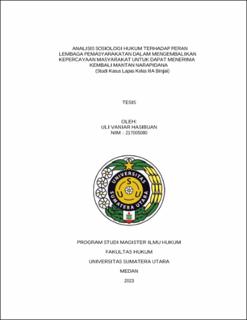| dc.contributor.advisor | Ediwarman | |
| dc.contributor.advisor | Marlina | |
| dc.contributor.advisor | Trisna, Wessy | |
| dc.contributor.author | Hasibuan, Uli Vaniar | |
| dc.date.accessioned | 2024-07-10T04:42:17Z | |
| dc.date.available | 2024-07-10T04:42:17Z | |
| dc.date.issued | 2023 | |
| dc.identifier.uri | https://repositori.usu.ac.id/handle/123456789/94477 | |
| dc.description.abstract | Correctional Institutions as a sub-system of criminal justice in Indonesia
should be able to create ex-convicts who are ready to reintegrate into society.
Correctional Institutions act as a control vessel to foster inmates so that they not only
provide a deterrent effect but also educate inmates. As happened in the field, there
are still many people who find it difficult to accept ex-convicts because ex-convicts
are not ready to integrate and repeat their mistakes.
The research method used in this research is empirical legal research. In this
study using a qualitative descriptive research method. This study uses data collection
tools in the form of interviews, observation and literature studies.
The type of research used in this research is empirical legal research. In this
study using a qualitative descriptive research method. This study uses data collection
tools in the form of interviews, observation and literature studies. Based on the
results of the sociology of law research, it was found that prisons act as a means of
social control which is responsible for supervising and fostering prisoners in full, the
guidance provided must also be in accordance with Law no. 22 of 2022 Concerning
Corrections, namely in the form of personality and independence as well as
preventive and repressive correctional efforts to create ex-convicts who are ready to
reintegrate into society. There are several efforts that can be taken to regain public
trust in being able to accept ex-convicts, namely, good coordination between prisons,
families and the community as a preventive effort. As a repressive effort, prisons are
more assertive in taking action against recidivists so that they are deterrent and do
not repeat their mistakes when they are released. | en_US |
| dc.language.iso | id | en_US |
| dc.publisher | Universitas Sumatera Utara | en_US |
| dc.subject | Sociology of Law | en_US |
| dc.subject | Correctional Institutions | en_US |
| dc.subject | Binjai | en_US |
| dc.subject | SDGs | en_US |
| dc.title | Analisis Sosiologi Hukum terhadap Peran Lembaga Pemasyarakatan dalam Mengembalikan Kepercayaan Masyarakat untuk dapat Menerima Kembali Mantan Narapidana (Studi Kasus Lapas Kelas IIA Binjai) | en_US |
| dc.title.alternative | Legal Sociology Analysis of The Role of Correctional Institutions in Restoring Community Trust to Be Able to Re-Accept Former Prisoners (Case Study of Class IIA Binjai Prison) | en_US |
| dc.type | Thesis | en_US |
| dc.identifier.nim | NIM217005080 | |
| dc.identifier.nidn | NIDN0025055405 | |
| dc.identifier.nidn | NIDN0007037501 | |
| dc.identifier.nidn | NIDN0123018601 | |
| dc.identifier.kodeprodi | KODEPRODI74101#Ilmu Hukum | |
| dc.description.pages | 156 Pages | en_US |
| dc.description.type | Tesis Magister | en_US |


